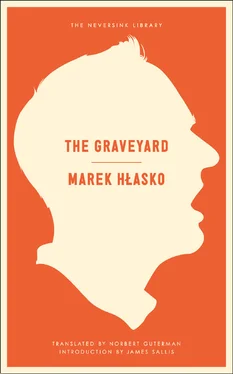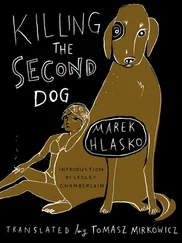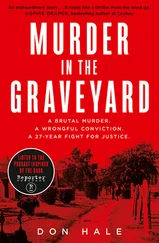“Attitude,” Nowak said dryly. “An attitude befitting a dog.”
Again they exchanged stares.
“If that’s the case,” the policeman said, “everything is in order.” He turned violently to Franciszek. “And what are you doing here, Citizen?” he asked sharply. “Maybe you …”
“I like it here,” Franciszek said. “Everything is just as it should be.” Nowak had gone away dragging his dog as a tow-man pulls his barge; Franciszek and the policeman looked at each other in silence. Suddenly Franciszek smiled. “Do you remember me?” he asked. “Surely you remember me.”
The policeman moved a step forward, and his face lit up. “Why of course,” he cried in a happy clear voice. “Of course I remember. I hooked you, didn’t I, for disturbing the peace …” He was as happy as a child who has just been given a beautiful toy, and patted Franciszek on the arm. “Yes, yes,” he repeated, his eyes sparkling, “It was you who disturbed the peace.”
“Well,” said Franciszek, smiling gloomily, “you might call it that.”
“Why?” said the policeman, and his face suddenly clouded. “Don’t you like the name?”
“Nonsense; I haven’t said anything of the kind.”
“And you’re very pleased about it, aren’t you?”
“What am I pleased about?”
“The fact that you haven’t said anything of the kind. Admit it.”
They were walking slowly across the deserted square. “Ah, my friend,” Franciszek said, “if you had gone through what I have, you’d realize that that isn’t enough: you like it, you don’t like it. I raised my hand against things which neither conscience nor reason can grasp, which are beyond human understanding. I know, I know it perfectly; I told you then that there were no such things. I told you — it’s a fact, I know I told you — that everything described as beyond human understanding is at bottom an absurdity and a lie, and a crime as well, and that it is not beyond man, but against man. That’s what I said, yes. I said that every human action can be measured only by a man’s endurance and life, and by the amount of happiness it gives him — however little. Yes, that’s what I said. What of it? Like everybody else, I had my moments of doubt. My dear man: the more moments of doubt that can be mastered by reason, the stronger the faith.”
He turned to the policeman, but he was walking alone — there was no one beside him. Somewhere near a fence three old women stood gossiping, and the young policeman was running toward them, holding up his long coat. A moment later Franciszek could hear his resounding voice: “Do you like it or don’t you?” and the frightened chirping of the three old women.
He entered a telephone booth and dialed a number. After a while he heard the click of the receiver at the other end. “Excuse me,” he said; “may I speak to Jerzy?”
“Who is it?” a woman’s voice asked.
“My name is Kowalski.”
There was a moment’s silence.
“Jerzy isn’t in,” the woman said. “Didn’t you know?”
“No, I didn’t.”
Again the receiver was silent for a moment. Someone knocked sharply at the booth window.
“On vacation,” said the voice in the receiver. “You understand — on va-ca-tion. Surely he is entitled to a vacation, isn’t he?”
Franciszek wanted to say something, but the receiver clicked at the other end. Again he was walking through the dark, empty city, which had been washed by rain for many weeks, and still refused to awaken to spring, the city with one neon sign over it: YOUNG PEOPLE READ THE BANNER OF YO H .” At home, he sat by the window in a cold draft; he looked at the blinking letters, and it seemed to him that over the noise and bustle of the city he could hear a sharp barking voice: “Do you like it or don’t you? Do you like it or don’t you? Do you like it or …”
Suddenly he turned around. “Why don’t you serve supper, Elzbieta?”
He heard her stand up heavily and move off to the kitchen. He followed her. “You’ve broken with Roman, haven’t you?”
She leaned on his arm and suddenly burst into tears.
“It will pass,” he said, stroking her cold, heavy hair. “Everything will pass, my child. Everything evil, stupid, inhuman. We must think that we are continually moving toward light; we must believe in it …” He fell silent, and stared at the darkness outside and the quivering neon letters, and once again — against his will — read them from beginning to end, mentally replacing the missing ones. Then he pushed Elzbieta away, and violently drew the curtain, so violently that some of its rings tore off.
HE STOPPED IN FRONT OF A TALL WHITE HOUSE, and checked the address on a slip of paper. He walked in, and was starting to climb the broad staircase when someone called from behind, “Hey, Citizen!”
He turned around, his hand on the banister: a soldier with a tommy gun slung over his shoulder stood on the landing below.
“Who do you want to see?” he asked Franciszek.
“A friend.”
“What’s this?” the soldier said, and his young face was suddenly clouded. “Without a pass? Come back down, Citizen.” He held out his hand. “Your papers.”
He slowly made out a pass for him on a red form, wetting his pencil and murmuring solemnly the while; finally he gave Franciszek his identification with the pass, and said, “Third floor.” Then, as Franciszek was beginning to climb, he added in a chiding tone, “Next time, Citizen, don’t try to get in without a pass.”
He stopped at the third floor and rang the bell. The door opened for him, there were whispers, and finally he stood before the man he had come to see. “Do you recognize me, Birch?” Franciszek asked.
The man standing before him, with a sickly face and sunken, lusterless black eyes, scrutinized him carefully. “Skinny,” he said at last, holding out his hand. “It’s Skinny, isn’t it?”
“Yes,” said Franciszek. “It’s me.”
They sat in armchairs. They looked at each other, trying to discover changes in one another’s faces and gestures; for a few moments an awkward silence prevailed. Then Franciszek, trying to hide his embarrassment, began to speak hurriedly: “You must excuse me for bothering you — I know people like you have no time even for their families, but my case …” He suddenly hesitated.
“Go on,” Birch said. “I’m listening.”
“Do you remember me as I was in the underground?”
“Yes, you, and the others too.”
“Will you help me?”
“Surely that goes without saying,” Birch said. “Talk.”
“I … I …” Franciszek said, trying to look the other straight in the eyes, “I raised my hand against the party. I don’t understand myself how it happened …” He turned scarlet. “You know, I was a bit tight, and I shouted that …”
He paused, suddenly overcome with a feeling that this talk was hopeless. “What did I shout?” he thought desperately, “What did I shout? After all, I said the truth, what I felt …” He went on: “I said that I didn’t believe that — that—”
“That what?”
“That it was possible to build anything valuable by means of crimes and lies, by destroying human dignity, by transforming Communist loyalty into slavery.”
“And what am I to do about it?”
“I want you — you, one of the men who have power and know the authorities — I want you to tell me: Where is the dividing line between loyalty and slavery, between crime and necessity? It was always reason that drew that line, reason and conscience. And now — that’s what I said then — now man has become only a miserable plaything of politics. We try to forget reason if we know what’s good for us; and as for conscience, that miserable thing, it’s better to think it never existed.”
Читать дальше






![Ричард Деминг - Whistle Past the Graveyard [= Give the Girl a Gun]](/books/412176/richard-deming-whistle-past-the-graveyard-give-t-thumb.webp)


